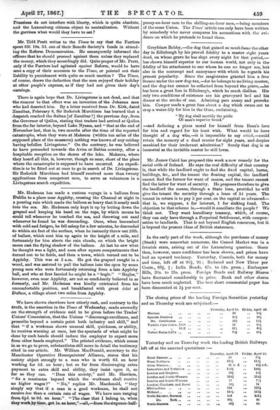We have shown elsewhere how utterly rash, and contrary to
the truth, is the assertion in the Times of Wednesday, made avowedly on the strength of evidence said to be given before the Trades' Unions' Commission, that the Unions "discourage excellence, and proscribe beyond a certain point both industry and skill," and that "if a workman shows unusual skill, quickness, or ability, he receives warning at once, lest the spectacle of what might be done by such hands should induce the employer to expect more from other hands employed." The printed evidence, which comes in as we go to press, substantiates still more in detail the testimony oiled in our article. Mr. William MacDonald, secretary to the Manchester Operative flousepainters' Alliance, states that his society object strongly to a man who is worth 6d. an hour working for 5d. an hour ; but so far from discouraging extra payment to extra skill and ability, they insist upon it, so far as they can. "Does this society," said Mr. Harrison, "fix a maximum beyond which the workman shall receive no higher wages ?" "No," replies Mr. Macdonald, "they simply say that if a man is a good workman, he shall not receive less than a certain rate of wages. We have men ranging from 6id. to 9d. an hour." "The class that I belong to, when they work by time, get Is. an hour," —a11,—from the sixpence-half- penny-an-hour men to the shilling-an-hour men,—being members of the same Union. The Times' article can only have been written by somebody who never compares his accusations with the evi- dence on which he pretends to found them.






























 Previous page
Previous page